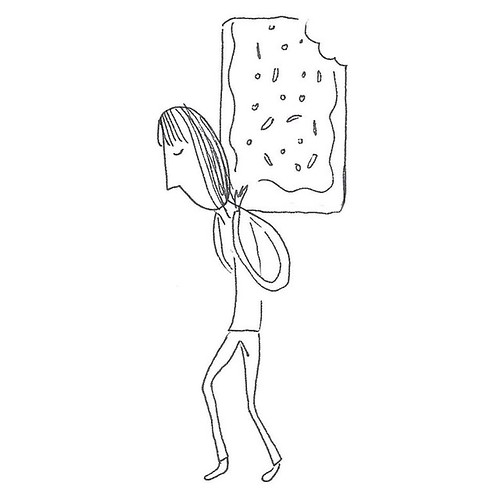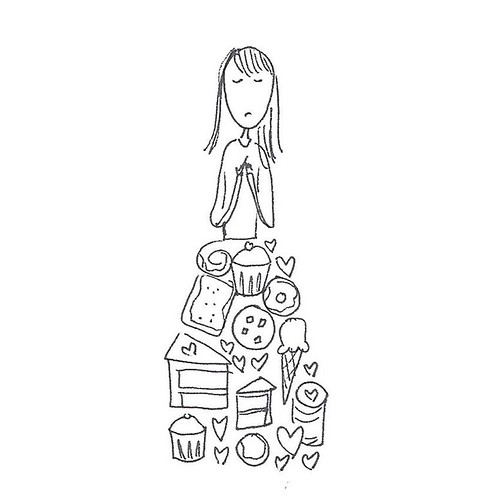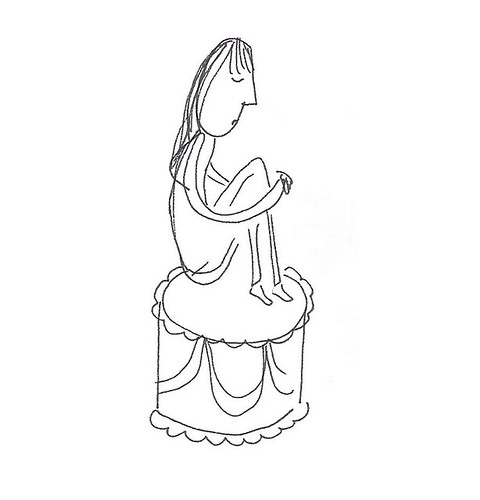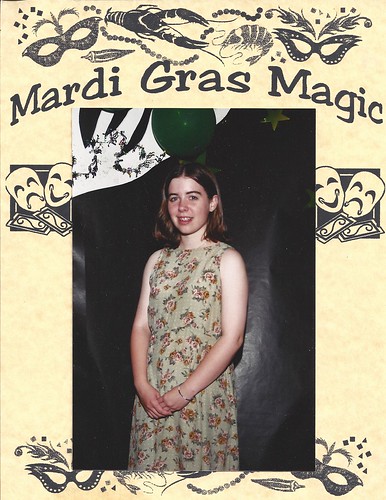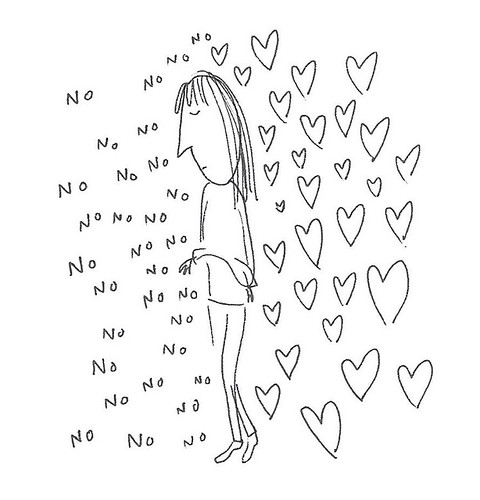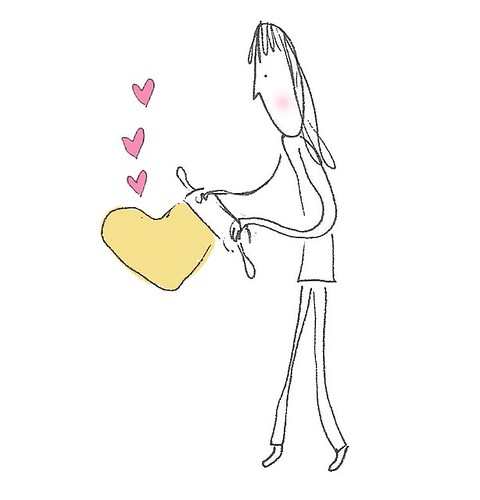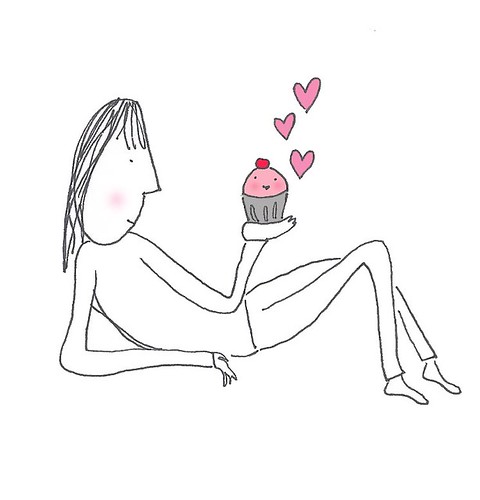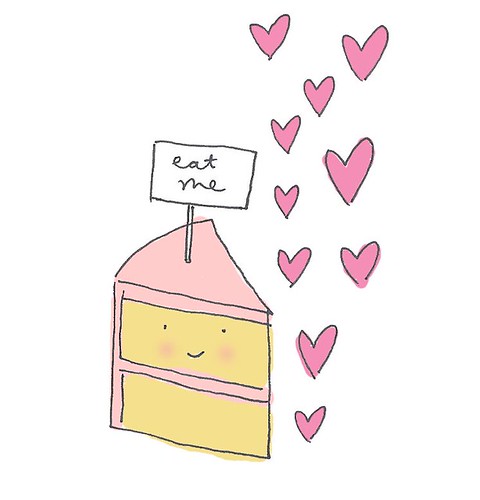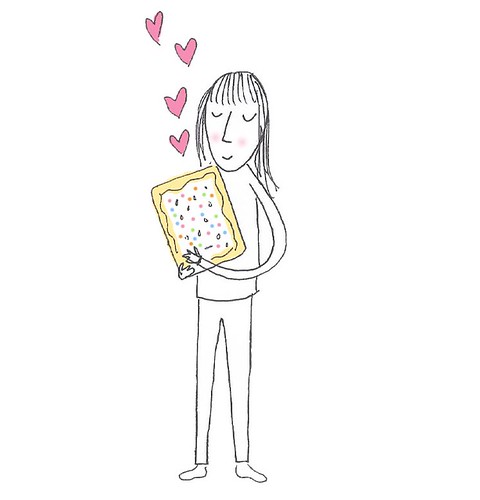Today, I'd like to discuss eating disorders. Yup, you heard me. True, this is a topic which is not often discussed on food blogs, it's a subject about which I am extremely passionate.
It's not a secret that I have suffered from various eating disorders in the past. I'm not alone.
According to the National Eating Disorder Association, in the United States, 30 million women and men have suffered from a clinically significant eating disorder at some time in their life. That's reported cases: it's estimated that only 1 in 10 eating disorders is ever reported or treated.
And this doesn't include eating struggles that don't technically classify as eating disorders. The National Institute of Mental Health reports that in the US, as many as one in every five women struggle with eating or have a clinical eating disorder.
But I am CakeSpy.
My case is interesting and unlikely in that today, I happen to run, and be best-known for, a blog dedicated to dessert. A history of disordered eating may seem at distinct odds with the fact that I write about, draw, and pretty much live dessert and sweet treats.
But with a little more explanation, it might not seem all that crazy.
We all deserve dessert.
Whenever I am part of Q+A sessions, at book readings or panels, the most frequently asked question does not involve my work much at all. It is this:
"How do you stay so thin?". Oh, there are variations: they may say "how are you not 300 pounds?" or "you can't eat MUCH of what you bake..." et cetera.
At moments like this, part of me cringes, thinking of how my website and writing present an all dessert all the time image. With a history of disordered eating, does this mean I've been living a lie?
Nope. I do enjoy sweets. I adore sweets. I eat something sweet every single day. Sometimes it is something small like a chocolate truffle, sometimes it is something big and fat, like a slice of behemoth crumb cake (one of my all time favorite recipes).
The difference between me and a non disordered person is that after I eat a fat slice of cake, there is a voice that wants to tell me IN ITS OUTDOOR VOICE that I am absolutely not permitted eat for the rest of the day, and maybe tomorrow too, just to be safe. An eating disorder tries to tell me that I don't "deserve" things that other people do.
Following years of personal work and therapy, I have learned to make a concerted effort to supercede these voices with a healthier one that tells me that I am OK, that I deserve to enjoy delicious things.
I strongly believe that the perceived "negative" or "unhealthy" aspect of desserts is far outweighed (pardon the pun) by the benefits they offer to your very soul.
As a result, it has also become part of my goal to ensure readers that they are ok, too. I suffered a lot with eating disorders; I want to do whatever I can to ensure that others do not.
So when I say that you deserve to eat a nice, creamy slice of cake or fat wedge of pie, I mean it--for you and me both. We deserve to enjoy things purely because they are delicious and make us happy. Let me put it like this: you could live without cake. But what kind of joyless life is that?
So when people ask me how I "stay so thin", I am honest. I tell them that I eat a balanced diet, that I do yoga every day and walk almost everywhere (nobody likes these answers, btw, hoping instead that I will tell them I have a medical condition or at least gave up gluten). But I also tell them that I refuse to deny myself sweets. Believe it or not, giving yourself permission to enjoy sweets makes it far less likely that you'll over or under-indulge. Pretty revolutionary, huh?
So when you've made a dessert like cadbury creme eggs benedict or cookie cake pie, it is in no way a good idea to eat the entire thing. But will a small serving kill you? No. In fact, it might just make your day a little sweeter.
Why speak up about eating disorders now?
Disordered eating has been on my mind a lot recently, for a few reasons.
One: I have been working on writing what I hope one day could be a memoir of my story--from eating disorder to dessert queen. I'd buy the book, but then I'm biased, am I not?
Two: Recently, I shared on my personal Facebook page that I had done a phone interview about my eating disordered past. This was the update.
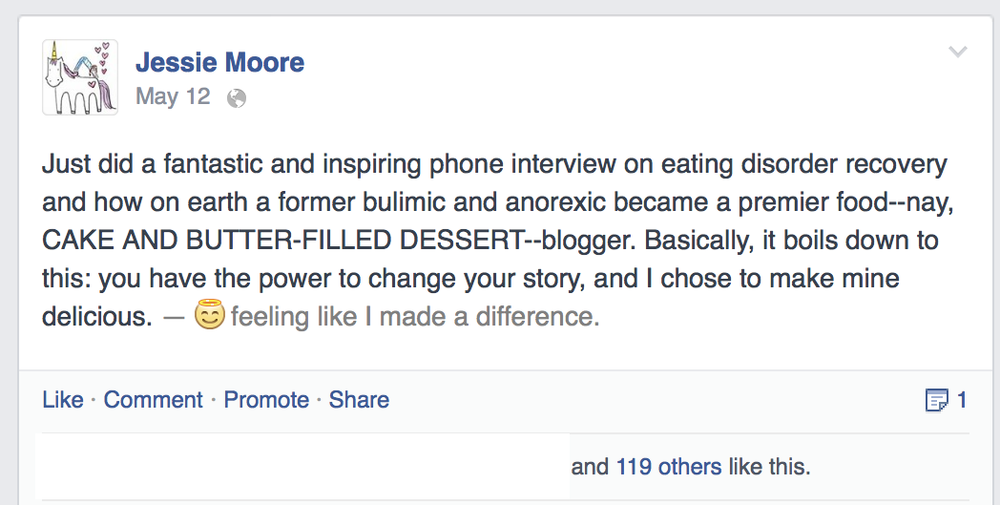
The reaction to it stunned me. Not only in terms of "likes" and comments, but also with the behind-the-scenes reactions. I have been contacted by numerous women and men privately, who have shared their own tales, and sympathized with me.
Very importantly: more than one of these private responders was somehow connected to the food industry.
This fact was equal parts heartening ("I'm not the only one!") and horrifying ("we've all been alone together!").
All of the aforementioned things have made me realize that now more than ever, it is important to be open about my story. Why? Eating disorders have a huge shame factor. If I can shed some light on the subject, perhaps it can help erase some of the stigma so that others can begin to emerge from the darkness.
My story, Readers' Digest form.
Some say that people with eating disorders are like loaded guns: they have all of the genes in place to pre-dispose them to disordered eating, but some event needs to "pull the trigger."
For many, including me, this thing is dieting. I started my first diet at age 12, following a comment before my 8th grade dance that I had "thick ankles". Here I am on the day of that dance:
(Thankfully, the offensively thick ankles are out of the shot)
What I heard, of course, was not that my ankles were thick but that my ankles were fat, which quickly grew in my mind to "you are fat".
I can see now that I was a normal girl, not thin and not chubby--just kind of average build. But even an offhand comment during this sensitive time can set off a girl with a predisposition to disordered eating.
From fat ankles to eating disorder in five easy steps
- I began exercising, ostensibly to slim down those fat ankles, and decided to speed things along by dieting. I received many compliments about my new and improved physique.
- Surprise: I was hungry all the time. I couldn't keep it up. One day I gave in to my hunger and ate more than I ever thought I could in one sitting.
- Frightened by how I felt mentally and physically after what I now know was an eating binge, I went on an even stricter diet to compensate for what I was sure was a stand-alone incident.
- Surprise, again: that started a cycle that graduated to an unhealthy cycle of starving followed by an inevitable binge. I began to make myself vomit, too, a terrible habit which stayed with me for more than ten years.
- Gradually, I was able to cease the bingeing and purging, but took it too far, into anorexic territory. My weight plummeted, but I still only saw myself as chubby.
When I started CakeSpy, I fell into the category of "sub clinical" or what many adorably call "almost anorexic". This means that I didn't classify clinically, but I still harbored a lot of the disordered thoughts.
Even before I started the blog, I baked; there's a joke that "nobody bakes like an anorexic". In my experience, this is true. Anorexics love to see others indulge in what they feel they cannot. But I never lost a love of dessert. Even at my lowest weight, I always reserved a few of the calories I did allot myself for sweets.
One day, finding myself yearning for a life beyond my refrigerator magnet company job, I had a sit-down with myself that went something like this: "well, in an ideal world what would you want to do?".
There was no hesitation. In my ideal life, I would do something that involved writing, illustration, and baked goods.
After further self consultation to figure out the perfect name, CakeSpy was born. Since I didn't know exactly how to get something rolling that would include writing, illustration, and baked goods, I decided to start a blog while I figured it all out.
On the day I started my blog, I weighed about the same as your average 11 year old girl. Little did I know, this blog would actually save my life.
Healing, with cake
Someone wiser than me once said "keep your friends close, but your enemies closer". I never thought of my blog in that way, but it really was.
At first in my blogging days, I would get scared frequently. Trays of brownies had the potential to panic me, I felt I had to revolve an entire day's meal plan around indulging in a slice of cake. In the beginning, it was only on a very strong day that I was able to eat and enjoy one of my own baked goods without giving myself a major guilt trip afterward. But I kept on doing it.
The more I worked with food, the less scary it became. It would take time to trust food; in the beginning, I was content to at least fear it less.
Food is both the enemy and the savior with an eating disorder. Often, your dealings with it are furtive, secretive.
For me, it it was cathartic to work with food so openly, intimately, and in such a tactile way: to touch it, smell it, be in its presence. To inhale the aroma of butter creaming with sugar. To see cakes rise in the oven. To roll pie dough. To knead bread. Understanding the process of how things were made gave me an appreciation, and little by little, trust grew.
Of course, it didn't hurt that I was also receiving a lot of professional therapy, too.
I began to experiment with food beyond simply baking at home. I would challenge myself to take part in experiences baking or eating with other people. Sometimes I would feel panicked, but more often than not I would be rewarded by the experience. I found myself capable of doing things like judging baking contests (even if I took the most minute bites you could possibly imagine) and not only sampling, but allowing myself to enjoy, my own baked goods. I found myself capable of doing it with abandon. If other people could do it, I figured, I could too.
I have gained weight since I started CakeSpy. Not just because I've eaten more sweets (which I have) but because I've learned that I actually need food, not only to live but so that I can be good to the people I love and do the things I want to do: write, do crazy yoga poses, walk for miles while talking with friends, travel, experience, love, and create.
Speaking of creating, that is the other way in which CakeSpy has helped me heal. It may sound funny to say this, but one of the ways in which the blog helped heal my eating disorder had nothing to do with the food: it had to do with my sense of purpose and accomplishment. It is something I have built by myself, featuring my art: my writing, my illustrations, my creations. I cannot understate the positive effect it has had on my life to know that my work has had an impact on others.
Yes, an eating disorder has to do with food. But for me, recovery isn't merely about trusting food: it's about trusting yourself, and life.
Am I cured?
Let me say this: I do believe in full recovery for eating disorders. But for me, recovery remains a moving target. Why so?
Because at one point, when I was bulimic, I would have said "cured" was no longer bingeing and purging. Well, I reached that goal, but then I plummeted to an alarmingly low weight and suffered a slew of related health consequences. So, no, that was not really cured.
At this point, I have not shown clinical signs of eating disordered behavior in years. I can eat a slice of cake like nobody's business. However, I am hesitant to say without a doubt "I am cured!".
Because I still have weak moments. I can still feel panic when someone shoves a cookie in my face and says "try this!" or berate myself for eating too much. I don't always like eating in front of others. I can observe that in times of crisis (real or perceived), I turn to food obsession as a way to set structure in what seems like a crazy, out of control world.
So with that in mind, instead of stating absolutes such as "cured" or "diseased", I will designate myself as a "work in progress".
THE MORAL:
CakeSpy has helped me in recovering from disordered eating, as backwards as it may seem. It has helped me pave my own way in the world, to believe in myself and my ablities, and to keep growing in a postive way. If I had to share a big takeaway, it would be this:
Your story does not need to be open and shut, black or white. It doesn't have to follow the same story arc as a movie.
Basically, it boils down to this: you have the power to change your story, and I chose to make mine delicious.
If you or someone you know has an eating disorder, or you suspect that eating may have become a problem in your life, I urge you to seek help. Both professional and from your family and friends. Do not make disordered eating your own private island.
Comments? Questions? I welcome them. Leave a comment here (moderation is enabled, so if it doesn't pop up right away please forgive me), or email me: jessieoleson@gmail.com

